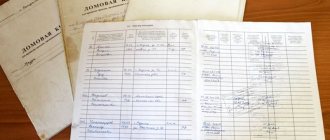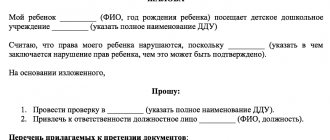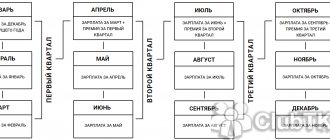A house register is a document confirming ownership of the premises; all citizens registered in a particular place are also indicated here.
The house book contains the following information:
- About the living space and its technical parameters.
- About registered persons, indicating the dates of their registration or deregistration, as well as check-in and check-out.
A house register is created for each residential premises, with the exception of “Social housing”. The need to maintain a document is stated in paragraph 85 of the FMS order.
What is a house (apartment) book and why is it needed?
Let's start with the fact that the laws do not have a specific definition of the term “house book”. Previously, the form of the document was approved by order of the Federal Migration Service of Russia No. 288 dated September 11, 2012, during the period when the migration service was responsible for registering citizens. The document reflected the entire history of registered citizens in a private house or apartments in apartment buildings, and the owner of the premises had to maintain it. The first house books began to appear at the beginning of the 20th century and were used primarily for communal apartments. For each registration of a change, the house management collected a state fee and affixed a stamp as confirmation.
In 2021, the responsibility for keeping records was transferred to the Ministry of Internal Affairs of Russia, for which order N 984 of December 31, 2021 was issued. From that moment on, all registration of citizens at their place of residence was transferred from paper documents to electronic databases of the Ministry of Internal Affairs of Russia. Information recorded on paper can no longer be the basis for providing certificates about family composition or issuing information about persons living at each specific address. Nowadays there is no need to keep house books and apartment cards up to date. All archives of these documents are kept by passport officers or premises owners. There is no need to take them anywhere specially.
By Order No. 984 of December 31, 2021, the Ministry of Internal Affairs of Russia has CANCELED the maintenance of house and apartment books by citizens.
In the regulations regarding the registration procedure at the place of residence, you are unlikely to find a mention of this outdated document, but in some cases, for example, regarding real estate transactions, it may be needed.
Since the archive of this document is still in use in some cases, it is important to know what it is. Previously, books were always created for each individual room. So, if there were two apartments in a private house, a document was created for each of them separately. In an apartment building, apartment books were opened, and they were kept by passport officers from the housing department, homeowners association or management company.
Alteration
In addition to everything that was stated above, the book also includes the square footage of the territory on which your property is located, as well as the number and location of extensions on it.
So, in case of any changes (if there are new buildings or if they are demolished, including if the copyright holder changes, or if there are people who want to be registered at your address), you must immediately contact the nearest FMS department with a request to make changes.
In addition, it is noted that in such cases it is absolutely forbidden to :
- Transfer the house register to other persons (intermediaries) in order to speed up this process;
- Make changes yourself.
House book form. Where did you get it and how did you start it?
The document was called Form No. 11 and looked like an A4 album, the cover of which was made of cardboard for better preservation.
- In the center of the cover the address of the household was indicated: city, street name, house number, apartment (provided that there were several of them in the house).
- Next was the start date of logging. When issuing a new one, the end date of its maintenance was indicated on the old one.
- The prepared forms of the house register were fastened together with obligatory sheet numbering and lacing.
- The employee who carried out its registration was certainly obliged to leave his signature and seal of the institution in which the document was registered.
For apartment registration, Form No. 10, called an apartment card, was used, and for registration, Form No. 9, a registration card, was used. The form was available for purchase in the store. In some of them it is still sold to this day. Many people downloaded the form to fill out from the Internet and filled it out according to the example.
Background
For a long time it has been necessary to track the movements of people and know their exact place of residence. At first these were revision tales and confessional paintings.
Then household books appeared, which were kept on collective farms and village councils. In cities there were apartment cards.
Everyone who arrived at a new place of residence had to be assigned to some kind of dwelling, which was entered into the registration documents.
Today, they continue to keep house (apartment) books, and in rural areas – house and household books.
House book cover
Book registration
The owner independently filled out the house book only for a private house or a house in which the form of management through the management company or HOA was not determined. The apartment book was completely handled by the passport officer of the Criminal Code. To register it, it was necessary to come to the FMS department serving the territory. Before coming to the service, the purchased form had to be filled out without errors. Most often, they tried to fill in block letters, which prevented the possibility of misreading what was written. In addition to the completed form, in order to receive a registered book, it was required to provide the following documents:
- Russian citizen passport.
- An extract from the Unified State Register of Real Estate confirming the right to own the house.
- Application for book registration
If it was not the owner who handled the paperwork, then it was necessary to have with you a notarized power of attorney from the legal owner of the house. Processing usually took 3-5 business days. The procedure was carried out free of charge. If desired, it was possible to apply through Multifunctional Centers (MFC), which are often located much closer than the Federal Migration Service.
Since the procedure for registering a house register strictly required the personal presence of the owner or his authorized representative, it was impossible to complete it completely online. But it was possible to speed up this procedure through the State Services website, mainly for booking an appointment.
Documents to be received
To obtain and register house books, you must submit an application and a certain package of documents to the registration authorities. These include:
- identity documents;
- housing papers;
- information about all registered persons.
You can provide the book form yourself or request it from the registration authority. When submitting an application, a representative will also need to provide a power of attorney for him.
Validity
The receipt and validity of house (apartment) books is not limited by any period of time by law. They are maintained and filled out as long as there is room for entries. In practice, changes of owners and residents do not occur so often that this document needs to be changed.
Design rules
Before registration, the house register had to be filled out. Who could have done this? The owner of the property, fortunately, there are still many examples of filling it out on the Internet. It is important to note that there were a number of specific requirements. The book had to be bound and numbered correctly:
- The pages are numbered strictly in order. All entries were made only with a fountain pen.
- Lace all the sheets. Usually with a strong thread in several turns or thin twine.
- The tail of the lacing was glued to the thick cover from the inside. A strip of paper was glued to the top for marks.
- On paper for o or "numbered". The number of pages was indicated not only in numbers, but also in words.
- After checking the correctness of completion, an authorized person certified the completed book.
- Errors in the form were not allowed, since this led to a number of problems during subsequent paperwork, for example, when registering benefits or entering into an inheritance.
When the owner discovered inconsistencies in the data, a request for correction was written. All adjustments had to be confirmed by an employee of the registration authority. It was impossible to independently add new residents, discharge a deceased relative and not register updated records. Without this, the document had no legal force. When changing ownership, there was no need to create a new book. Changes were made to an existing copy. A new book was started if the current one was damaged or if there was no room left in the old one to make entries.
Validity period and storage features
All books currently have the status of archival documents and are not officially used. The house book can be kept in the hands of the owner, so it is necessary to follow certain rules for its use:
- Do not hand it over to strangers for safekeeping. The state does not take responsibility for its safety, so it can only be stored directly with the owner. Even people who live in the house but are not its owners cannot keep it.
- Residents of the house are capable of intentionally or accidentally damaging or ruining the house register, so it is worth keeping it out of their reach.
- It is strictly forbidden to tear out sheets from the house register, even if the information written on them is no longer relevant. All pages are numbered and bound, so if even one of them is missing, the book will be considered legally invalid.
- Under no circumstances should the dead be erased from the book. Corrections had to be made by an authorized specialist.
How to get a copy or restore a house register if it is lost or has become unusable
It is currently impossible to obtain such a copy. Order of the Ministry of Internal Affairs of the Russian Federation dated December 31, 2017 No. 984 (hereinafter referred to as Regulation No. 984) does not provide for the issuance of books for a private house or apartment, and, consequently, their restoration. The archive of the apartment register is kept by the passport officer of the HOA or management company, but they will not be able to give you a copy because The document contains passport data of the old residents. In this case, when issuing the document, the passport officer will violate the Federal Law “On the Protection of Personal Data” and therefore will refuse to issue it.
Even if the owner has lost the house register or it is missing, he is not responsible for this.
Before the changes in the order, it was possible to restore the document by writing an application to the Federal Migration Service or by contacting the MFC.
Recovery from loss
Unfortunately, no citizen is insured against the unexpected loss of certain documents, which may include a house register.
In such cases, it is worth repeating exactly all the actions you once performed when you first received the document, that is:
- Visit the FMS office;
- Provide a list of required documents (with currently relevant information);
- Wait a little and get the book;
By the way, it is also worth noting that if you lose this document, it is not necessary to write a statement to the police (as, for example, if you lose your passport).
To learn about the need for this magazine for owners of private houses, see the following video:
When you might need it
Previously, it was required to carry out purchase and sale transactions with private houses, and was handed over along with other documents when registering transactions in Rosreestr. Now you don’t need it to make these transactions. It may be required in controversial situations or legal proceedings regarding property rights, when several people claim the living space. There is usually no such problem with apartments. Related government agencies, banks, etc. may require it. If you have it, you can provide it. If not, refer to the order of the Ministry of Internal Affairs N 984 of December 31, 2021 on its cancellation. If it is persistently demanded by some authority, write an official request to the manager, again with reference to the order. This usually helps to avoid complying with inadequate requirements of specialists who are not aware of changes in legislation.
Although the need to maintain house books has been abolished at the legislative level, they have not yet lost their importance. After all, the house register stores information about all citizens living or temporarily registered in the house. It is written out in one copy, even if there are several owners of the living space. If necessary, the document will be given by one owner to another. It is worth storing it carefully in case you need to restore your registration data. Based on the house register, an extract is prepared which is used in many authorities.
How to apply?
The owner or tenant of real estate who wishes to acquire this book must provide:
- passport and other identification documents;
- certificate certifying ownership;
- extract from the Unified State Register;
- if the housing is not yet owned, then documents such as a will, privatization certificate, deed of gift, and court decision will be required;
- certificate in form No. 9.
The stationery itself, Form No. 11, is purchased at retail by the apartment owner or tenant, after which it is provided to the FMS archive for making records about people who were registered at this address.









